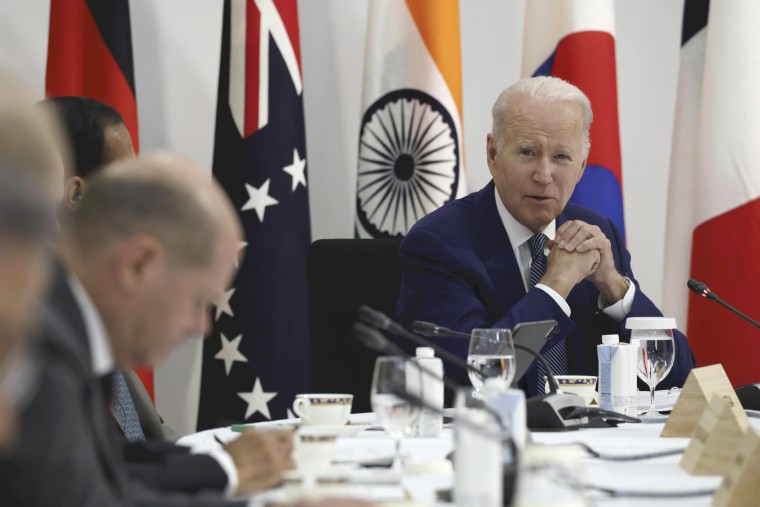HIROSHIMA, Japan — Striking back at China’s aggressive use of economic power, President Joe Biden and leaders of other advanced democracies have been working toward a collective strategy to foil what they say are Beijing's attempts to intimidate businesses and nations for political gain at the Group of Seven summit this weekend.
Members have been considering ways to to defend against what they describe as coercive tactics that China deploys for political leverage. Far more than at past G7 summits, the leaders gathered in Hiroshima have devoted attention to an issue they contend is a troubling outgrowth of Beijing’s growing economic might.
Heading into meetings Saturday, Biden and his counterparts planned to “outline a common set of tools to address concerns that each of our countries face, including from economic coercion,” Jake Sullivan, the White House national security adviser, told reporters.
A 41-page summit communiqué released Saturday made overtures to China but also included a vow that “we will foster resilience to economic coercion.” Succinct as it is, the statement showed at least some threshold level of unity when it comes to countering China's economic clout.
The communiqué also announced the creation of a new initiative to “increase our collective assessment, preparedness, deterrence and response to economic coercion.”
“There was never a communiqué before that ever mentioned coercion,” Rahm Emanuel, U.S. ambassador to Japan, told NBC News in an interview Friday. “You can’t find it.
“Given the frequency with which China turns to this instrument and tool, you can’t just have an ad hoc strategy,” Emanuel added. “You have to have a coordinated strategy that is well thought out, with all the tools available, and you know how to respond.”
In a strongly worded response on Saturday, a spokesperson for China’s Foreign Ministry accused the G7 of “smearing and attacking China, and grossly interfering in China’s internal affairs.
“The G7 talks about ‘moving toward a peaceful, stable and prosperous world,’ but what it does is hinder international peace, damage regional stability and suppress the development of other countries,” the spokesperson said. “Such actions have no international credibility at all.”
Reaching any sort of international consensus around China is tricky. The G7 countries are scattered across the globe and have distinct trade and diplomatic relations with Beijing.
French President Emmanuel Macron, whose country is part of the G7, visited China last month and caused an uproar in the West when he suggested in an interview that France should strive for “strategic autonomy” and resist falling under the sway of either the U.S. or China.
“In the run-up to the G7 summit, French officials have complained privately about pressure from the U.S. to get behind a more confrontational approach to Beijing,” Noah Barkin, a senior adviser at the Rhodium Group research firm, wrote in a newsletter.
Identifying instances of China’s coercive use of economic power isn’t always easy.
“These things are very specific and almost idiosyncratic — case by case — and often difficult to prove,” Thomas Cynkin of the Atlantic Council said in a news briefing, citing an example of banana exports from the Philippines being left to rot on a dock in China and asking whether it was because Beijing was retaliating for some perceived slight or whether it was a simple mistake.
Still, experts have been chronicling cases of what they describe as an abuse of China’s outsize influence as the world’s second largest economy.
A report in March by the Center for Strategic and International Studies pointed to a Taiwanese government office that opened in Lithuania two years ago. China considers Taiwan part of its territory under its “one-China” principle, and opening an office under Taiwan's name ran afoul of a Chinese norm, the report says.
The backlash was fierce. After the opening was announced, China rejected permits for Lithuanian food imports, and firms in the eastern European country had difficulty getting Chinese contracts approved, the report said.
Last month, China opened a cybersecurity review of Micron Technology, a U.S. memory chip maker. The move was seen as retaliation for the Biden administration’s imposition of export controls aimed at depriving Beijing of computer chips that underpin its military and economic expansion.
“They’ve gone from targeting countries to coercing companies,” said Emanuel, a former Chicago mayor and White House chief of staff in the Obama administration.
The G7 communiqué does not specify how member countries should parry China. Blunting any punitive action taken by China calls for coordinated action and resolve on the part of the U.S. and its allies, analysts have said. If China were to boycott a certain company, other nations might conceivably respond by stepping in and offering lines of credit so that the business doesn’t collapse.
Earlier this year, the European Union reached an agreement that allows retaliatory action against nations that use economic muscle to get other countries to bend to their will. As a deterrent, the E.U. would hit violators with import tariffs, for example.
“If you have coordinated, unified, collaborative action, you can beat back economic coercion,” Emanuel said.

